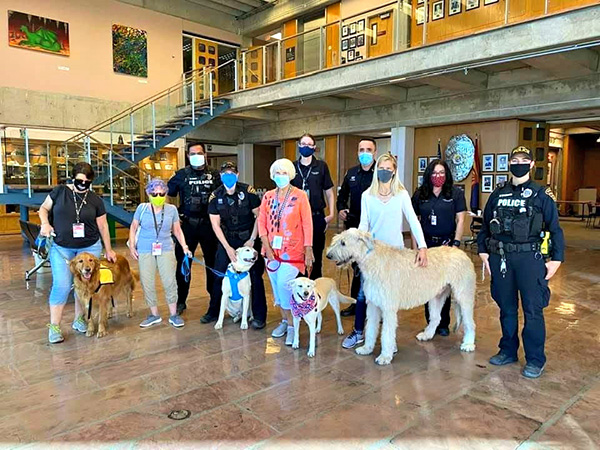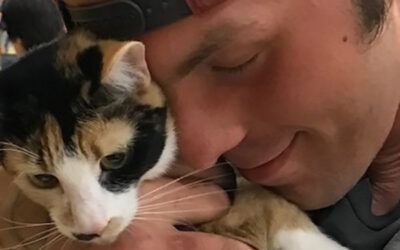Therapy dogs have been recruited at airports, in courtrooms, and in libraries to calm harried travelers, bring a sense of security to fragile victims, and improve reading comprehension among school children. With increasing frequency, canines are a part of programs at correctional institutions where inmates are responsible for their care and welfare, leading to an improvement in the mental health and wellbeing of both prisoners and animals. Horses have also been included with remarkable success.
In recent years, people have even found ways to incorporate domestic animals and pets into all sorts of fitness activities, such as interactive doggie workouts and goat yoga, and the trend shows no signs of abating anytime soon. Interacting with animals has been proven so effective for improving the human condition that they have been routinely utilized in hospitals, rehabilitation centers, and nursing homes for many years now.
On a local level, the benefit to patients and other community members is recognized by Pet Partners of Southern Arizona (PPSAZ). One of their lead organizers, Diane Alexander, sat down with us recently to fill us in on PPSAZ’s mission and explain the gist of how it works. The all-volunteer group is a community partner of the national nonprofit PetPartners.org., which focuses on touching lives and improving health and wellbeing through visits with pets that come in all shapes and sizes. Diane, along with her dog Ella, has been spreading the joys and wisdom of the human-animal bond here in Tucson for quite some time.
“We have roughly 75 therapy teams with nine different species of animals that take part in the program, not just dogs,” Diane explained. “The majority of therapy dogs are golden retrievers and Labs because they’re so easy to train. But our southern Arizona handlers have cats, rabbits, birds, horses, pocket pets, Guinea pigs, and other animals. They are registered rather than certified, but there is still a process teams have to go through.”
“Teams” are made up of the animals and their handlers, aka pet parents. As mentioned earlier, they are all volunteers, and Diane noted that many are retirees and seniors, but there are younger members as well. Becoming a registered therapy team consists of four steps. First, you’ll be required to complete the Pet Partners handler training course — training for the human end of the leash. This can be accomplished online. “We hope to be able to also offer the in-person version of the Handlers course in the future,” Diane added.
Next, you and your animal will have to pass a 22-part Pet Partners team evaluation. In the evaluation, the team demonstrates both their skills and aptitude for therapy visits. You can read about the evaluation process on either the Pet Partners national website or the local website. Assuming those two steps are greenlighted, your veterinarian will then need to fill out a health screening for your pet. After that, it’s only a matter of submitting your completed registration packet. Once everything is reviewed by Pet Partners, you will receive a letter confirming your registration, and you can start visiting. Your badge and tag will follow.
Obviously, dogs must have basic obedience skills, and all critters must enjoy being petted as part of the criteria for acceptance into the program. But the ideal therapy pet is recognized as being well-socialized, controllable, predictable, non-aggressive, not too shy, and is comfortable in various environments. The animals also need to be at least 1 year old and resided with their handler for at least 6 months to be considered.
The territory PPSAZ covers include Pima, Pinal, and Cochise counties. In addition to uplifting and comforting patients in hospitals, teams visit crisis centers, memory care and assisted living facilities, police stations, reading programs, at-risk youth programs, and community outreach activities, including the University of Arizona, Pima Community College, and Davis-Monthan Airforce Base.
Before the pandemic, PPSAZ had more requests for therapy animal teams than they had volunteers, so they were frequently reaching out and inviting folks to join them. As things begin to open back up, scheduled visits will undoubtedly rise — especially after all of the stressors so many people have faced. It also stands to reason that with that rise, the need for registered teams will likely increase.
So, how does it work? Requests or invites can come from facilities or groups expressing interest through the local or national websites, but often it’s handlers reaching out to individuals and organizations they’d recognize as benefitting from their presence. Handlers, for their part, can make their own personal preferences known, and Pet Partners will do their best to match them with the environment they’re seeking. Hospice helpers, however, must undergo more training than other team members. Meetings between teams and small groups take place in outdoor settings, but they are sometimes set up in assembly rooms. Each visit is an hour in duration.
“One of our favorite group events is visits to the University of Arizona during exam weeks,” Diane shared. Library visits started in 2012 at the U of A law library and soon went to their Main library. The Main library now organizes the visits for the five on-campus libraries that the teams frequent. They include treats and coffee for students to make things as bearable as possible during exam week.
This particular program really took off between 2013 and 2014. Staff at the campuses began tracking interactions, and some years as many as 30 teams have visited with thousands of students, staff, and faculty members. The feedback to date has been phenomenal. While 2020 was a bust, PPSAZ is looking forward to getting back into action for exam week later this year. Under normal circumstances, school visits can occur twice a month year-round. The pandemic has been challenging to the teams since they could not visit.
Always moving forward and branching out, it’s not unusual for handlers and pets to step into crisis response situations after a loss. Last fall, their presence was requested by the Tucson PD as part of a wellness program for officers and staff. Lieutenant Dominic Flores, Wellness Officer with the Tucson Police Department & Chief Master Sergeant with the 162d Arizona Air National Guard, first contacted PPSAZ concerning visits with the Main station. The slots were immediately filled, and things took off from there with visits now occurring at their Main station, four substations, 911 centers, and records department. Davis-Monthan inquired about self-care visits for anyone on base, and that became an instant hit as well.
Due to animals’ shorter lifespans and the expanding need for the benefits that come from the animal-human bond, Pet Partners is always looking for assistance. Diane, who also volunteers with Gabriel’s Angels in Prescott, Phoenix, and southern Arizona, has been making the rounds with Ella for PPSAZ for at least seven years, and Ella is 14 now. She loves the work but is pragmatic about the numbers.
“There is a tremendous need for teams. Dogs and people retire or pass on, so there’s always that need. We’re always hoping people will reach out to us to become a part of the program. If they’re interested in kids, seniors, hospice, whatever, we can accommodate them. We even work with inmates in correctional facilities for their benefit, too. Across the board, the work we do is rewarding and fun. Anyone who wants to get involved or who may have questions can contact us through info@petpartnerssoaz.org.”
One of the ways Diane has found to make it fun is by utilizing Pet Partner trading cards. They’re like baseball trading cards but with team members’ pets. They feature the pet or animal on the front of the card and its stats on the back. Pet Partners uses them nationally, and their southern Arizona community partner has been handing them out to anyone interested in them for years.
“I lead with them when meeting people during visits as sort of an icebreaker,” Diane excitedly admitted. “They’re a great calling card, and some people like to collect them, particularly students. It’s just something fun to share with people and get the word out there.”
For anyone who feels they’d like to become a part of an organization such as this, it is truly a rewarding experience. And if you’re worried about flexibility and making it work with your own schedule, don’t. It’s a nonissue. Volunteers are afforded tons of flexibility. As referenced earlier, handlers can make their own personal preferences known and Pet Partners of Southern Arizona will do their best to help them find the right environment for them. Besides that, who wouldn’t like to see their very own pet featured on a trading card they could pass out and trade, given the opportunity?
The nine species the Pet Partners Therapy Animal program officially registers so far are: dogs, cats, horses, rabbits, birds, guinea pigs, rats, mini pigs, and even llamas. Established in 1990, Pet Partners community partners are currently in all 50 states and overseas, with 13,000 handler teams performing 3 million visits annually. For more information, visit them at petpartnerssoaz.org or petpartners.org for the national program.













